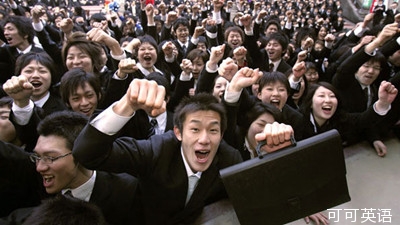商業報道
Japan's hiring practices
日本招聘
Hello world
世界,你好
Japanese firms are waking up to the merits of hiring globe-trotting recruits
日本開始意識到全球范圍內雇傭人才的好處了
RYOSUKE KOBAYASHI is the only Japanese undergraduate in his year at Harvard University.
Ryosuke Kobayashi 是哈佛那一屆唯一的的日本本科生。
When he applied, he knew no one who could advise him on how to get in.
當他提交申請的時候,沒人給他提供指導意見。
So this week, in a rickety wooden inn in Tokyo, sitting cross-legged on tatami mats with Apple Macs on their laps, he and fellow Harvard students conducted seminars for Japanese high-school students on subjects ranging from anime to Thomas Hobbes.
因此這個星期,在東京一間不穩固的木屋酒店里,他和幾位哈佛同學盤腿坐在榻榻米上,腿上放著蘋果Macs筆記本電腦,為日本高中生舉辦了一個研討會,從日本動畫談到托馬斯 霍布斯。
 He was not encouraging students to go to America, he insists, just offering them an alternative to uchimuki, or the culture of looking inward, which pervades Japan.
He was not encouraging students to go to America, he insists, just offering them an alternative to uchimuki, or the culture of looking inward, which pervades Japan.
他并不是慫恿學生去美國上學,他堅稱道,而是給他們提供uchimuki——或者說,日本盛行的內向型文化—以外的另一種選擇。
For example, in 1997 there were roughly equal numbers of Japanese, Korean and Chinese students at Harvard, including postgraduates.
比如,在1997年,哈佛的日本、韓國、中國的學生幾乎一樣多,
Now there are five times as many Chinese as Japanese, and three times as many Koreans.
但現在,中國學生是日本學生的五倍,是韓國學生的三倍。
The story is similar at other foreign universities.
其它國家的大學也一樣。
Meanwhile, Japanese firms have lost ground to their Chinese and South Korean rivals.
同時,日本企業也被中國和韓國企業比下去了。
Some say this is no coincidence.
有人說這不是巧合。
Yasuyuki Nambu, the boss of Pasona, a Tokyo-based recruitment consultancy, says Japanese universities churn out students for old-fashioned businesses, rather than fast-growing global ones such as IT and retail.
Pasona的老總Yasuyuki Nambu認為日本大學培養出大量從事過時行業的學生,而不是從事全球性的增長勢頭強大的行業,比如IT或者零售。
Japan Inc needs more creative thinkers and linguists. So several firms are courting young Japanese who have been abroad.
日本公司需要更多有創見的思想家和語言家。因此幾大企業正覬覦著留學歸來的日本學生。
Jobs fairs for those who have studied abroad are suddenly popular.
所以,針對那些曾出國留學的工作招聘會突然流行起來了。
Mynavi, the sponsor of one, says the number of participating firms soared by almost 50% since last year, to 188.
主辦人之一Mynavi說從去年開始,參與的企業數量增長了近50%,達到188家。
Keidanren, Japan's big-business lobby, has promised to hold a special jobs exchange for students returning from abroad next summer, tacitly admitting that Japan's traditional hiring schedule hobbles them:
Keidanren,日本經濟團體聯合會,已經承諾明年夏天為海歸派特別舉辦一個工作交流會,并默認了日本傳統的招聘方式阻礙他們前途了:
people are recruited in Japan to start work in April, which is during the academic year in America and Europe.
被聘用的人四月份才開始工作,那時正是歐美的開學節。
The University of Tokyo, Japan's best, is mulling starting in September instead, to fit in with the rest of the world.
日本最好的大學,東京大學,正考慮加入世界大家庭,也換成九月份開學。
In other countries there has long been a market for footloose talent.
其它國家自由流動的人才一直都有市場。
But in Japan students usually have just one shot at securing a steady first-time job: in their third year at university.
但在日本,通常學生只有一次機會謀求第一份穩定的工作,即大學三年級的時候。
If they are abroad, they miss it, and may have to study an extra year in Japan to earn their chance.
如果他們出國留學了,他們將失去這個機會,并且可能要在日本再上一年學才可以得到第二次機會。
That has discouraged people from studying abroad.
這就降低了人們出國留學的的欲望。
And corporate culture in Japan has tended to favour those who follow the rules: training is done “on-the-job”, which implies little respect for what was learned at college.
此外,日本的企業文化業也青睞于那些按規矩辦事的人:訓練是在工作中完成的,這就意味著他們不大尊重大學期間學到的知識。
Pasona reckons the change has accelerated since March, when Japan was hit by an earthquake that disrupted the nation's supply chains and power plants.
Pasona估計三月份開始——日本遭遇的地震擾亂了國家供應鏈,破壞了發電廠——變化更加明顯了。
The population is ageing and shrinking; to avoid shrinking with it, Japanese firms must expand overseas. Recent months have seen a surge of foreign mergers and acquisitions.
日本人口更趨老齡化了,并逐年減少。為了避免跟著一起衰落,日本企業必須從海外擴張。最近幾個月日本的海外并購更多了。
But while hiring trends may have started to reflect this shift, corporate culture has not.
聘用趨勢可能開始發生變化,但企業文化卻毫無改變的跡象。
Hierarchy and pay remain rigid in many Japanese firms–you do what you are told and get what you are given.
日本企業依舊存在嚴格的等級制度以及支付傳統—做好分內之事,然后領工資。
Well-travelled recruits may not like this. And if they don't, they can go elsewhere.
而見多識廣的新人可能不吃這一套。如果他們不接受,那自有其它地方可去。
 He was not encouraging students to go to America, he insists, just offering them an alternative to uchimuki, or the culture of looking inward, which pervades Japan.
He was not encouraging students to go to America, he insists, just offering them an alternative to uchimuki, or the culture of looking inward, which pervades Japan.
 He was not encouraging students to go to America, he insists, just offering them an alternative to uchimuki, or the culture of looking inward, which pervades Japan.
He was not encouraging students to go to America, he insists, just offering them an alternative to uchimuki, or the culture of looking inward, which pervades Japan.